What is self awareness and why it is important?
Self-awareness is the ability to understand oneself and the ability to be aware of one’s own motives, emotions, thoughts, and actions.
Signs of low self awareness/lack of self awareness
- The inability to recognize your impact on others
- Problems with relationships due to poor communication skills
- You’re unable to identify what you need in order to be happy
- You lack knowledge about your personal values
- You have trouble accepting feedback from others when they disagree with you or challenge your point of view
Signs of high self awareness
- You’re able to accept criticism without feeling attacked by it
- You can take responsibility for mistakes that have been made while understanding that mistakes are inevitable parts of life (and therefore not something we should feel bad about)
- Even if no one else acknowledges what you’ve done right (or wrong), at least you do!
Discover The Power Of Self Awareness Through Meditation
Meditation is a practice that can be used to reach a higher state of self-awareness and spiritual awareness. When you are able to step back and observe yourself, you can gain a greater understanding of your true personality and values.
In meditation, you focus all of your attention on one thought or sensation. You allow the mind to empty and become still. This then allows you to access hidden parts of yourself. By practicing meditation, you will be able to increase your self-awareness, your spirituality, and your overall self-esteem.
Meditation unlocks different level of consciousness. A highly advanced meditation practitioner achieves a unique level of awareness that can be only experienced. With at least 1000 hours of meditation practice, in this state you will experience your individual self (a sense of ego) merging into the cosmic self.
You begin to experience that you are an exact replica of the macrocosm, and that you are just about as infinite and eternal as the universe.
How To Use Meditation For Self Awareness
It’s not hard to see the multiple benefits of meditation — from increased self-awareness and peace of mind to stronger spiritual ties. But how can you really maximize its impact on your life? Here are five ways to use meditation for self-awareness:
- FIND A PEARL OF WISDOM.
Meditation is all about finding that one pearl of wisdom that will help you grow and change. When you find it, capture it in a meditative mantra or quote. Write it down and stick it on your refrigerator, so you can constantly see it and refer to it when you need guidance.
- MAKE MEDITATION YOUR OWN SPIRITUAL EXERCISE.
The first step to personal growth is recognizing where you’re stuck. Meditate regularly to uncover the areas of your life that feel constraining and unfulfilled. Once you’ve identified these areas, take action to liberate yourself from them.
- CREATE A HIGH LEVEL OF SELF AWARENESS.
When we’re constantly present in our thoughts and feelings, we build up a clear understanding of ourselves. This self-awareness allows us to set reasonable limits on our behavior and respects our unique strengths and weaknesses. It also opens our eyes to problems we may have been overlooking.
- DISCOVER YOUR POWER TO TRANSFORM.
Given the right conditions, anyone can improve their outlook on life. Meditation helps cultivate this mindset by encouraging calm and presence while deepening your understanding of yourself. You’ll be surprised at just how strong your resolve can become when you know exactly what you stand for.
- RELEASE ANY HARM THAT HAS HAPPENED TO YOU.
When something negative happens in our lives, it can leave us feeling vulnerable and insecure. The bad energy generated by traumatic events can linger in our minds and body, gradually producing negative effects in both areas. By practicing meditation regularly, we can break this cycle and relieve any pain or suffering that has been caused.
The Benefits Of Meditation on Self Awareness
There is something enormously powerful and liberating about being in touch with our true spiritual selves. By practicing meditation, we can access that power and begin to develop greater self-awareness.
This awareness leads to a heightened sense of spiritual consciousness or mindfulness, which allows us to connect more deeply with our inner core and intuition. Through meditation we can also gain some insights into the nature of life and existence, both on an individual level and as part of a larger whole.
Indeed, there are countless benefits to becoming more spiritually aware, including increased inner peace and resilience, better mental clarity, increased spiritual understanding and enlightenment, and increased creativity. For anyone looking to explore new horizons and awaken their true potential, meditation is definitely one way to go.
Self-awareness is also discovering one’s path to their true Self in spirituality. It detaches one from all the bondages and negative emotions and sets a person free from suffering. Self-awareness is questioning, identifying, recognizing, and changing (if necessary) one’s beliefs, values, and principles and leading to the most authentic form of ourselves.
Spiritual aspects of Self awareness that leads to Self-Love
As you start the journey of self awareness, you will be making a spiritual quest. You will be looking within yourself, exploring your inner-self and discovering what makes you who you are. This is an exciting adventure that will help you grow as a person and lead to more happiness in life.
It’s also important to understand that self-awareness is not just about understanding yourself better but also about loving yourself more fully as well. By being aware of your strengths and weaknesses, desires, goals and motivations; by knowing how things affect you emotionally; by learning how to take responsibility for your actions; by being able to appropriately express emotions through positive communication—all this contributes to your self growth and also in the development of healthy relationships with other people including family members, friends or colleagues at work place.
When you’re aware of yourself, you will be able to make better decisions in life. You will know what is best for you and what isn’t. You will have a clearer idea of your goals and objectives in life. You will be able to make choices that are more aligned with who you truly are as a person rather than allowing other people or circumstances dictate how you live your life.
What is lack of self awareness?
Lack of self awareness is the cornerstone of all negative life patterns. It is one of the reasons people continue to repeat the same mistakes over and over again. They don’t see what they are doing, or why they are doing it.
This leads to a vicious cycle of behavior which we call ‘self sabotage’ (when you do things that hold yourself back from achieving your goals). It also means that most people rarely take responsibility for their behavior or actions, because they don’t understand what’s going on in their minds and bodies.
They’ll blame others for any problems in relationships with them, rather than seeing how they have contributed to the situation through their own actions or words (or lack thereof).
Levels of Self Awareness through Meditation
Self awareness is the ability to be aware of yourself and your thoughts, feelings and actions. It’s knowing what you’re thinking, feeling or doing at any given moment in time without judging yourself for it. By becoming more self-aware, you can understand what drives your behavior and how you can better manage those impulses in a way that will positively impact your life.
There are different levels of self-awareness skills that can be achieved through meditation:
- The first level is being aware that we exist in the present moment by focusing on our breathing and body sensations. This gives us a momentary break from our thoughts and allows us to reconnect with ourselves physically before returning back into our daily lives with renewed energy.
- The second level requires paying attention to what’s happening within ourselves during those moments when we are not busy thinking about something else; this includes anything from noticing how we feel after eating certain foods (which might mean we need less sugar), recognizing when negative emotions arise (such as anger) before acting on them so they don’t lead us astray – these are all great examples! Not only does this practice help us become more self-aware but also helps us recognize emotional triggers too so they don’t affect our mental health negatively over time!
- There are a total of nine levels of awareness as propounded by Sage Vyasa and Patanjali. Each level of self reflection represent the spiritual evolution of the individual.
1) Intellectual awareness
Intellectual awareness is also called Vitarka Pragya. Vitarka means reasoning or opinion. And Pragya means knowledge. It deals with the reasoning abilities of one’s Self.
Intellectual awareness is knowing what you know, what you don’t know, and how you learn best. Intellectual awareness is the capacity to reflect upon and understand one’s own thoughts and beliefs, to appreciate the nature of one’s own mental processes and the ability to discriminate between self-generated ideas and those received from external sources.
Intellectual awareness can be described as a type of metacognition – it is a higher order form of thinking about thinking. It requires that an individual be able to think about their own thinking, which requires them to have some degree of insight into their own mental processes. This is the first level of advanced understanding of self.
2) Investigative awareness
The great book of Yoga of Patanjali calls it Vichara Pragya. Vichara pragya is a practice that helps you to be present, learn and grow through your experiences. It is a practice of inquiry and observation, it is about curiosity and seeing things as they are.
It is a way of life that helps you to see the world around you with fresh eyes every day. It’s about slowing down and being in the moment. It’s the quality of being able to see things as they are.
It doesn’t mean looking at things with judgement or criticism, but rather observing them with clarity and openness. It’s about seeing things as they are without attachment or aversion. At this level you develop an advanced level of mental alertness.
3) Blissful awareness
This is also known as the Ananda Pragya. Ananda Pragya is an advanced level of awareness achieved through meditation, it is a state of consciousness that enables one to experience a blissful state. The word ‘Ananda’ means bliss and ‘Pragya’ means knowledge or understanding. Thus, when the two are combined they mean blissful understanding or knowledge of the self. In Vedic literature, it has been described as one’s ability to experience the divine essence within oneself and also in others.
4) Self-awareness
Self-awareness is also called Asmita Pragya, and Asmita is the Sanskrit word for ego. As we discussed earlier, this kind of awareness detaches itself from all sorts of egoistic sufferings on this planet. When the peak of self-awareness is reached, the meditator senses a solid urge to question everything and experiences a merge with the cosmic world.
5) Yoked awareness
Yoga sutras and Upanishads call it vashikara pragya. The primary meaning of vashikara is “to conquer” or “to overcome” something or someone.
In Srimad Bhagavat Gita, Krishna tells Arjun:
ध्यायतो विषयान्पुंस: सङ्गस्तेषूपजायते |
सङ्गात्सञ्जायते काम: कामात्क्रोधोऽभिजायते || 62||
Shrimad Bhagwat Gita, Chapter 2, verse 62
Meaning: While contemplating on the objects of the senses, one develops attachment to them. Attachment leads to desire, and from desire arises anger.
Vashikara Pragya is the ability to control the mind and its thoughts. We all want things in life, but what happens when we do not get what we want? We become angry, upset, frustrated and disappointed. This leads to negative feelings about ourselves, our life and the world around us.
We may have a desire to travel abroad or buy a new car or buy a house in the city; however, if we do not get what we want, what happens then? We start to distance from the positive self. We start having negative thoughts like “Why did this happen? Who is responsible for it?” The more we think about this situation, the more depressed we become which will affect other areas of our life as well as our relationships with others around us.
6) Cessative awareness
This state is called Virama Pratyaya. A highly advanced level of alertness that helps you maintain a pristine focus on the task in hand. There are no fleeting thoughts or no internal noise.
7) Natural Awareness
Bhava Pratya, which also means mental stillness, is what this is. At this level, it is not a stillness that you create; it’s an absence of the incessant internal chatter that normally fills your head.
When you achieve this level of consciousness, you will be able to tap into the deepest part of yourself at any time. You will be able to access intuition and insight as well as creativity and compassion.
When you go beyond even concentration and focus, when you experience total cessation of all mental activity, something profound happens: you experience a complete stillness of the mind.
For many people today, this is an alien concept. We live in a world so full of distractions that we rarely stop to notice how overwhelmed our minds can be. But when you learn to quiet your mind, when you learn to observe the thoughts and feelings that arise in it without getting caught up in them—when you begin to see through the illusion of your own ego—you experience true inner peace.
8) Skillful awareness
This type of awareness is also called Upaya Pratya, and Yajurveda describes Upaya as being skillful. This state of awareness helps meditators spread love and light to the whole world.
A skilled Awareness master is a person who has mastered the art of self-awareness, but also uses their awareness to help those around them. They are able to retain their natural awareness of light and love, yet operate in the world forever helping others.
9) Supreme Awareness
This is the ultimate level of awareness, also called Para Vairagya. It means supreme detachment.
The adept at this stage develops altruistic consciousness remaining unaffected by his or her desires. He or she is able to look at his or her own desires and thoughts with a dispassionate eye, analyzing their consequences and acting according to the dictates of reason. This person is not affected by praise or criticism, by success or failure, by joy or sorrow.
The adept does not fall prey to temptations, but neither does he or she avoid them; he or she has learned not to be attached to them. The adept faces every situation without fear, without anxiety, without depression and without any sense of egoism; he or she has mastered himself completely.
How To Get Started With Meditation
When it comes to discovering the power of self awareness, there is no better way than through meditation. Through this practice, you can learn to quiet your mind and focus on your innermost thoughts and feelings.
Meditation can also help you connect with your spiritual side, enhancing your overall wellness and happiness. If you’re interested in starting a meditation practice, here are some tips to get started:
- First, make sure that you have the right environment for meditation. Some people find it helpful to sit in a quiet place with minimal distractions, while others prefer to meditate in nature. Once you have decided on the setting, take some time to relax before beginning your practice.
- Once you have established an effective method for relaxing yourself, it’s time to begin your meditation practice. Throughout your session, be mindful of how you are feeling both mentally and emotionally.
- Be aware of any thoughts or ideas that enter your mind, and try not to react to them. Instead, simply observe them quietly without judgement.
- By practicing meditation regularly, you can deepen your understanding of yourself and gain greater self-awareness. By cultivating this skill, you can use it to enhance your wellbeing in all areas of your life.
The Benefits Of Self Awareness Through Meditation
Anyone who has ever tried mindfulness meditation or any other form of self-awareness knows that it can be extremely powerful. When we become aware of our thoughts, feelings and sensations, we open up to a new level of emotional insight and understanding.
Self-awareness isn’t just about feeling happy or sad. In fact, simply becoming more aware of ourselves can help us improve our physical health, mental well-being and relationships. Here are a few of the many benefits of self-awareness through meditation:
Improved Mental Health
When we become more “aware” of our thoughts, we may find that some irrational fears start to disappear. For example, if you have a fear of spiders, you may begin to notice when your mind starts to wander off to scary spider scenes. Once you’re aware of these intrusive thoughts, you can start to challenge them and eventually overcome them.
Similarly, if you’ve been dealing with anxiety for years, mindfulness meditation could help bring your general level of stress down even further by teaching you how to manage cravings and negative thought patterns on your own.
Improved Physical Health
The same principles behind improved mental health also apply to improving your physical health. When we become more aware of how our body is feeling (from the stiffness in our neck after working at a computer all day to the racing heart when we’re nervous), we’re better equipped to take steps necessary to improve our well-being.
For example, if you tend to eat unhealthy food because you’re bored or stressed, learning breathing exercises for stress relief can help you break the cycle. Similarly, practicing TM regularly can increase your flexibility and overall strength.
Increased Sense Of Emotional Flow
Tap into your inner wisdom by becoming more aware of what emotions are firing in your head right now. When we try not to get caught up in our negative thinking, we may be surprised at how often life punches us in the face instead! Suddenly, things that used to bother us don’t seem so bad anymore–even if they were only briefly. By becoming more mindful, we gain a deeper understanding for ourselves as people as opposed to characters in a movie set in our heads.
Benefits of self awareness
Self-awareness is the beginning of the spiritual path. Having said that, the benefits of self-awareness don’t constrict only the spiritual plane; they also are extended to physical and psychological planes. And therefore, we present a list of benefits of self-awareness below.
Being empathetic:
One of the main advantages of self-awareness is that it makes us more empathetic toward others. You can create better relationships when you can empathize more. We all have the urge to be understood and the need to have our feelings supported. When we are offended, we frequently need this the most before we can listen to another viewpoint or a more reasonable explanation.
Increased self-control:
Being able to name your emotions while avoiding automatic reactions to them is another aspect of increasing self-awareness. It requires you to develop a sense of distance from them. Being able to reason past your immediate feelings results from this. As a result, you can exercise more remarkable restraint when angry and respond instead of reacting.
Improves creativity:
Increased creativity can be an advantage of self-awareness at work, even though you might not believe so. Issues will inevitably arise that call for original solutions.
Being self-aware is one of the keys to developing your creative potential. It’s also one of the hardest things to do because it requires us to be honest with ourselves, which is often uncomfortable.
When we are aware of what makes us tick and what our strengths and weaknesses are, we can use this knowledge as a foundation for developing our own unique style and voice.
The ability to be self-aware is a key component of emotional intelligence, according to the Harvard Business Review. Being self-aware means that you can recognize your emotions and thoughts, and understand how they affect others. Self-awareness also allows people to control their impulses and manage stress.
People who are highly self-aware tend to be more creative than those who aren’t, according to research from the University of Toronto Scarborough. The researchers found that people who are more aware of their own emotions are also better at solving problems when they’re distracted or have less time.
Self awareness is the first step towards self-improvement. Being aware of your own limitations and strengths, as well as how they impact your daily life will allow you to take steps in the right direction toward growth.
Knowing yourself means that you are able to focus on what matters most in your life so that you can improve it even further. It also helps reduce stress levels because when we understand ourselves better, we are able to see where our weaknesses are and work on them so they do not hinder our progress in any way.
It also allows us to effectively communicate with others when needed while knowing what type of person we’re dealing with – whether they’re assertive or agreeable; dominant or submissive; trusting or distrusting etc.?
Barriers to self awareness
- Lack of self-confidence
- Emotional immaturity
- Lack of self awareness
- Fear of failure
- Lack of self esteem and worth
Why can’t you be self-aware?
Self-awareness is good for the overall spiritual development of the individual, but it’s not easy to master. Some are unwilling to take action, and there are specific barriers to this self-awareness. If we can recognize where we’re failing, we can master self-awareness.
That is why we present certain pointers that help you to identify what could be your cause. Self-awareness includes so many things that we cannot accept and embrace. While digging into them could surface emotional scenes, ultimately, they are a lifesaver.
Fear of emotions
This is the most significant barrier to self-awareness. While healing, many suppressed emotions in the body rise up, or you would need to dig that part of you that requires your love. And you would need to go into a series of emotional cycles and be courageous enough to embrace them!
Digging out old unpleasant memories
To master self-awareness, we need to dig out all those parts that are burnt deep inside us, the old memories, traumas, events, and harmful incidents. Only then will you be able to embrace it and release them all together.
Why do you avoid Self Awareness?
Self-awareness takes a lot of work, like shadow work and inner work. And that is the main reason why so many people tend to avoid this. But be brave. Because it will be difficult, but it is worth it.
Why do we have the urge to compare ourselves to others?
Our desire for social comparison is another amusing trait that stems from our evolutionary origins. Because social hierarchy has always been so important in the animal kingdom, even when we don’t mean to, we nevertheless assess social standing.
This renders us highly susceptible to societal messaging. Sadly, some of the most widespread messages in our culture inhibit self-awareness.
Your Thinking Brain vs. Your Feeling Brain
A lot is going on inside our heads. Our brain can be conceptualized as having two distinct halves: a Thinking Brain and a Feeling Brain. Your thinking, questions, and reasoning are all components of your thinking brain. It’s also what we believe to be in charge.
Unfortunately, it has much more to do with your Feeling Brain than you may realize. It serves as the foundation for all of our most basic emotional reactions. (It is also physically at the base of the link between our spinal cord and brain.) As a result, our emotions frequently influence our conduct without even being aware.
Self-awareness quotes
Here are some quotes that you might find helpful to develop self awareness skills.
- “Self-awareness gives you the capacity to learn from your mistakes as well as your successes. It enables you to keep growing.” – Lawrence Bossidy
- “When I discover who I am, I’ll be free.” – Ralph Ellison
- “Wisdom tends to grow in proportion to one’s awareness of one’s ignorance.”- Anthony de Mello
- Explore thyself. Herein are demanded the eye and the nerve.”- Henry David Thoreau
- “Without self-awareness, we are as babies in the cradles.”- Virginia Woolf
- “Until you make the unconscious conscious, it will direct your life, and you will call it fate.”- C.G. Jung
- “At the center of your being, you have the answer; you know who you are, and you know what you want.”- Lao Tzu
- “Self-awareness is only powerful when knowledge is understood and applied; only then can it manifest into true wisdom!”- Martin R. Lemieux
- “Self-awareness happens when we become aware of other people, things and places around us and how we are all connected.”- Toni Sorenson
- “To know yourself, you must sacrifice the illusion that you already do.” -Vironika Tugaleva
- “Self-awareness is the ability to take an honest look at your life without any attachment to it being right or wrong, good or bad.”- Debbie Ford
- “I spent many years seeking self-awareness and wondering what I should be doing on this planet.”- Rosanna Arquette
- “Self-awareness is not just relaxation or meditation. It must combine with activity and dynamism. Technology can aid that.”- Deepak Chopra
- “Self-awareness is one of the rarest human commodities. I don’t mean self-consciousness where you’re limiting and evaluating yourself. I mean being aware of your own patterns.” – Tony Robbins
- “Self-awareness is not self-centeredness, and spirituality is not narcissism. Know thyself is not a narcissistic pursuit.” – Marianne Williamson
Types of Self-awareness activities:
Briefly, the practices are around silence, solitude, abandon, resolve, listening, concentration, and gazing. Some of them include:
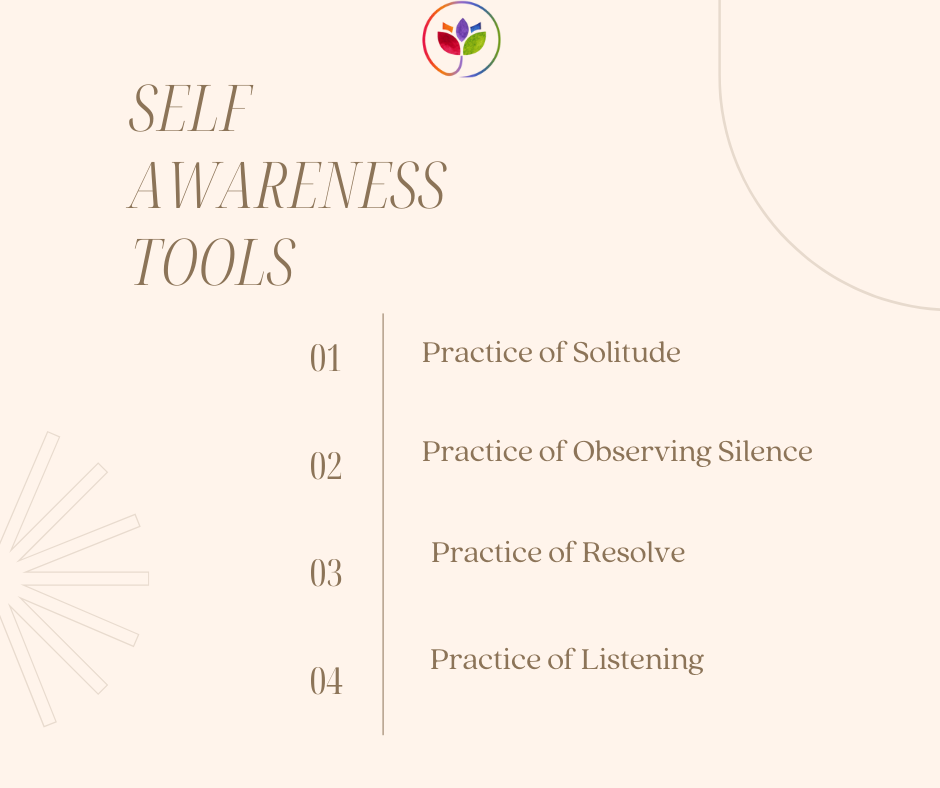
- Practice of Solitude – In the beginning, the practice of solitude is challenging because it is very difficult to tame a restless mind. Living in solitude requires great discipline but the results are rewarding as it contributes to mental transformation.
- Practice of observing Silence – When in complete silence, you will start to become aware of the talkative nature of your mind.
- Practice of Resolve – To do the aforementioned, you must display a certain degree of determination and resolve. As you continue to work toward your goal, your conditioned mind will weaken.
- Practice of Listening – The practice of listening is a simple and powerful way to build your concentration. Listening requires that you be alert and attentive in the present moment. Being able to live in the present moment is the goal of meditation. A mind that lives in the present moment does not, naturally, brood over the past or worry about the future. If you can afford to not think about the past or contemplate on the future, you have achieved a pseudo-meditative state.
- Practice of Letting Go – When you let go of everything that gives you grief, every agonizing emotion, every discursive thought, you can well imagine your blissful state.
Self-awareness exercises
Self awareness is not an innate trait; it’s a skill that can be cultivated. Here are some ways to increase your self awareness skills:
- Ask yourself questions about yourself. Write down everything that comes to mind and then read through it later. What themes do you see? What answers surprised you? What do you need to know more about?
- Get feedback from others. Ask people who know you well what they think of your strengths and weaknesses, and how they see you compared to others they know well. Take their feedback seriously and don’t get defensive if their opinion differs from yours or doesn’t match how other people see you.
- Look at the big picture in your life, including relationships with family, friends, partners and coworkers; work projects; finances; health issues; etc. How does each area relate to the others? How does each area affect your happiness overall? Which areas are most important for you to focus on now?
- Here are some examples of activities that can help you develop self-awareness:
Reflecting on work experiences. Think about how you approach different situations at work and how others perceive you. What do you do well? What would you like to improve? What are your strengths and weaknesses? What excites you? What makes you anxious? Take time to reflect on these questions before starting the workshop.
Observing yourself in action. Observe yourself in action by watching video footage or recording conversations with colleagues or clients. This can be helpful if you find it difficult to see yourself objectively, especially when making decisions about your own performance (see below).
Interviewing others about yourself. Ask someone who knows you well — such as a colleague, friend or family member — to complete an interview checklist with specific questions about your behavior at work (e.g., ‘How do I manage my time effectively?’).
Self-awareness journaling
This is one of the most powerful tools and is a game changer. Take out a notebook whenever you are self-reflecting. This helps to vent out any deep unconscious triggers inside you and is helpful to reflect on them. Try to journal every day and review them at the end of the month. This helps you focus on where you are lacking and need to be more aware of.
Self-awareness books
Reading self-awareness books helps you gain more knowledge on implementing certain strategies and the courage to practice them! We recommend some self-awareness books to you so that you can read them and have a vast knowledge about how to be aware of your own life.
- Emotional Intelligence: Why It Can Matter More Than IQ – Daniel Goleman
- A Self Awareness Journal for Women- Nancy Richardson
- Lifestyle Mastery Emotional Intelligence- Jacob Fitzgerald
- The 7 Habits of Highly Effective People- Stephen R. Covey
- Insight: The Power of Self-Awareness in a Self-Deluded World by Tasha Eurich
- Alchemy 365: A Self-Awareness Workbook- Brenda Marroy
- Awaken The Giant Within- Tony Robbins
- The Self-Aware Universe: How Consciousness Creates the Material World- Amit Goswami
Spirituality and self awareness
Self-awareness is the first step toward spiritual development. Spirituality is not just about meditation, yoga, healing, and karma. It is basically about self-awareness. Everything else, like trauma, healing, shadow work, inner work, and karma, comes after this step. Self-awareness is the best way to discover your true Self. Awareness is the center of healing. Our consciousness lies where we put our attention to. That is the point of ultimate joy.
Self-absorption is perpetually inward-looking. On the other side, self-awareness is ultimately for the benefit of external ministry. It is the life-giving fluid of our inner spiritual growth, enabling us to better serve and show others God’s love.
os.me community trending questions and answers on Self awareness
How do you deal with unwanted emotions?
If you’ve ever felt overwhelmed by a negative emotion like anger, inadequacy, fear or guilt, you know that it can be an awful experience. It can leave you feeling powerless and out of control. How do you handle unwanted emotions such as anger, inadequacy, fear or guilt? Read the answers or share your personal experience.
Is treating your own self with goodies, self-centeredness or self-kindness?
Taking care of your personal needs, giving luxury to your own self, treating your own self with goodies, isn’t it is Self-centeredness or does it qualify for self-kindness? Read the answers or share your personal experience.
What is your way to be confident?
What is your way to feel more confident about yourself? What are your ways you feel more free and how you boost your self confidence? Read the answers or share your personal experience.
What causes lack of self awareness?
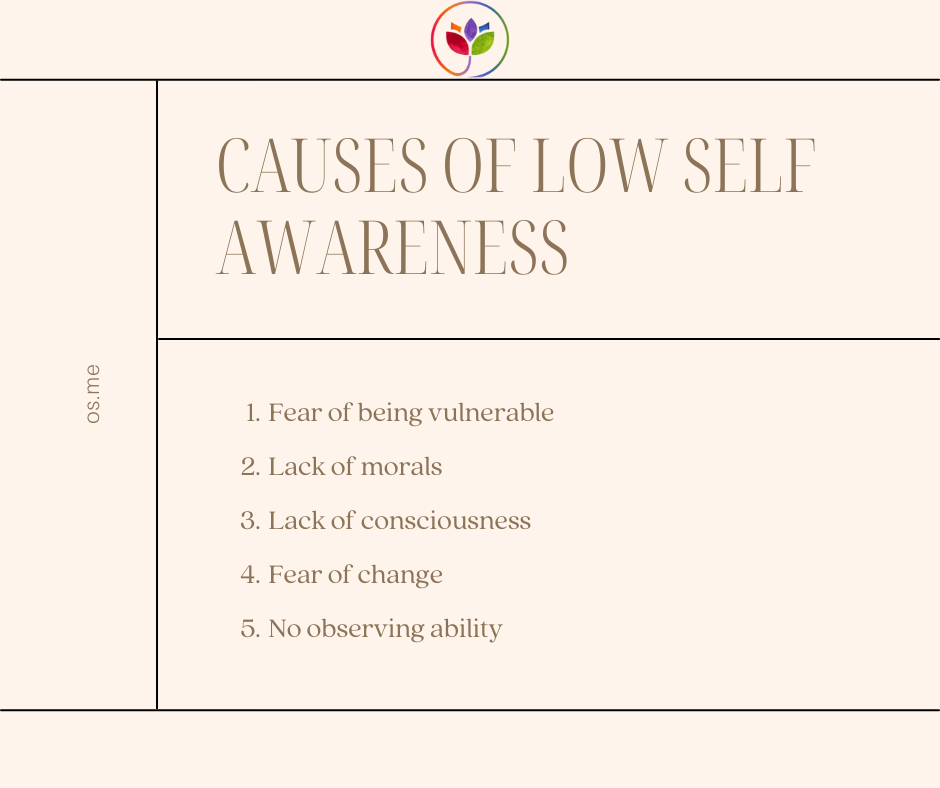
The lack of awareness is caused by many reasons, such as:
- Fear of being vulnerable
- Lack of morals
- Lack of consciousness
- Fear of change
- No observing ability
How does self awareness boost your confidence?
Self-awareness is not just recognizing one’s own beliefs and limitations but also accepting and embracing them. When you get yourself the way you are, you appreciate yourself. And this, in short, makes you feel good about yourself. This is a vital skill in self-awareness.
This helps us boost our self-confidence. When you know your responding tactics, behaviors, and anger issues, the body will automatically pull a back button and think. And practicing this regularly boosts confidence and inspires us to feel better.
How to improve self awareness? How to achieve your higher self with meditation?
Is it possible to channelize your suppressed or negative energy/emotions into something more creative and positive.


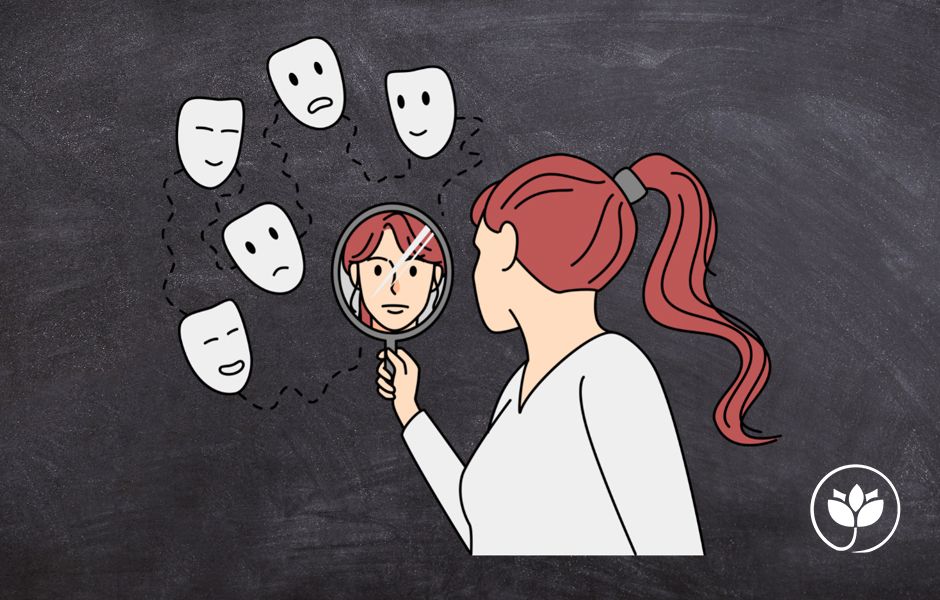
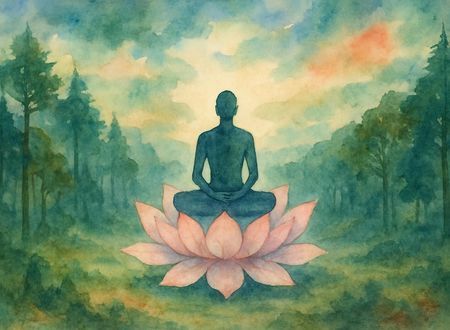
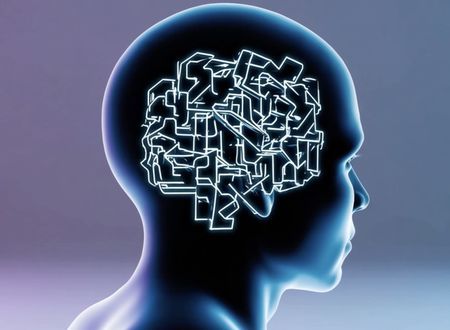





Comments & Discussion
0 COMMENTS
Please login to read members' comments and participate in the discussion.